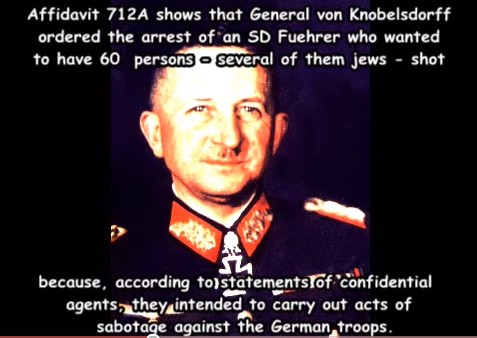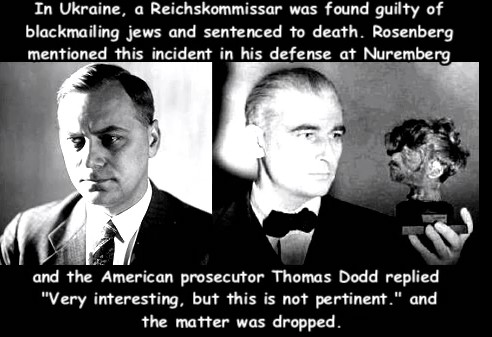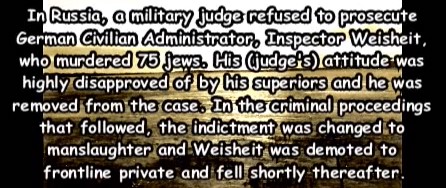
Nazis Punishing
Nazis For Mistreating Jews
Auschwitz Hoax
See: Final Solution Jews in German army
[Some circumstantial evidence for the Auschwitz Hoax.]
Konrad Morgen went to Buchenwald (touted for years as a death camp) and had a commandant executed for killing inmates.
[Video] Nazis Punished Nazis For Mistreating jews
Quotes
Morgen worked as both
investigator and judge prosecuting officials and guards in the concentration
camps for illegal activities. In the Buchenwald camp, four people were arrested,
including the former camp commander's wife, Ilse Koch. The main issue was that
3-4 prisoners had been killed some years earlier. Morgen sentenced two of them
to death. Ilse was acquitted on the charge of embezzlement, and the charge
against her levelled by the inmates of making items out of human skin was
withdrawn due to lack of evidence. Morgen had interviewed the prisoners at
Buchenwald, but couldn't prove their stories about Ilse making tattooed lamp
shades so he withdrew the charge.
....What Morgan did during the war flies in the face
of the standard holocaust story: Morgen sentenced to death the top two officials
of a concentration camp for killing just 3-4 inmates, years earlier. Not
hundreds, not thousands. Yet holocaust survivor stories tend to describe the
average guard as killing that many people every day, with and without an
alcoholic drink in one hand. Contrast with Morgen: he moved to the Buchenwald
area for 8 months, and had to really look, placing his staff to live in the
concentration camp itself. He wasn't investigating the current camp commander
Hermann Pister, but rather the former camp commander who had left 2 years
earlier. After some major sleuthing, Morgen found some corruption practices but
turned up no murder leads. Finally, near the end of 8 months, and looking at
records that were 3-5 years old, Morgen uncovered a stealthy way in which the
camp commander, Karl Koch, with the help of the camp doctor had killed around 4
inmates, and Koch was tried and sentenced to death. That doesn't fit with the
holocaust at all does it? In short, Morgen spent an enormous amount of time in
regard to the deaths of a few inmates that had occurred years before.
Konrad
Morgen
From July 1943 until the end of the war, Morgen investigated some 800 cases
of corruption and murder within the SS, which resulted in about 200 trials. Five
concentration camp commanders were arrested, and two of them were shot. For
example, Buchenwald commandant Karl Koch was executed by the SS for corruption
and murder. After the war Morgen established himself as a successful attorney in
Frankfurt.
I quoted from Morgen's description
of Buchenwald, where he lived for eight months:
The prisoners were healthy, normally fed, sun-tanned, working ... The
installations of the camp were in good order, especially the hospital. The camp
authorities, under the Commander Diester, aimed at providing the prisoners with
an existence worthy of human beings. They had regular mail service. They had a
large camp library, even books in foreign languages. They had variety shows,
motion pictures, sporting contests and even had a brothel. Nearly all the other
concentration camps were similar to Buchenwald. (Source: IMT "blue series,"
Vol. 20, p. 490)
Morgen also explained the reason
for the terrible conditions in the camps in the final months of the war, which
resulted in the horrible scenes filmed by the British and Americans when they
overran the camps:
To a great extent the horrible conditions at times prevailing in some
concentration camps did not arise from deliberate planning, but developed from
circumstances which in my opinion must be called force majeure, that is to say,
evils for which the local camp leaders were not responsible. I am thinking of
the outbreak of epidemics. At irregular intervals many concentration camps were
visited by typhoid fever, typhus, and other sicknesses caused especially by the
arrival of prisoners from the concentration camps in the eastern areas. Although
everything humanly possible was done to prevent these epidemics and to combat
them, the death rates which resulted were extremely high. Another evil which may
be considered as force majeure was the fluctuating numbers of new arrivals and
the insufficient billets. Many camps were overcrowded. The prisoners arrived in
a weakened condition because, due to air raids, the transports were under way
longer than expected. Towards the end of the war, there was a general collapse
of the transportation system. Supplies could not be carried out to the necessary
extent; chemical and pharmaceutical factories had been systematically bombed,
and all the necessary medicines were lacking. To top all, the evacuations from
the East further burdened the camps and croweded them in an unbearable manner.
(IMT "blue series," Vol. 20, pp. 498-499)
[1989] My Role in the [Ernst]
Zündel Trial
[Video] Nazis
Punished Nazis For Mistreating jews















Thomas J. Dodd [1945] Nuremberg

